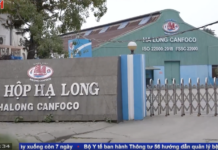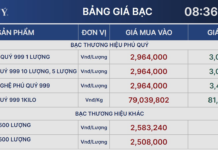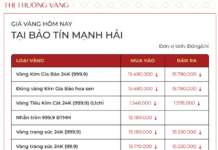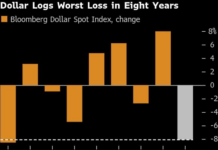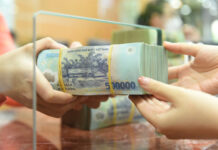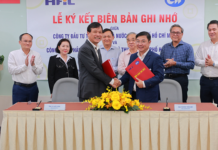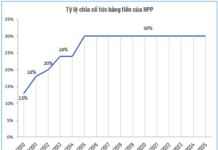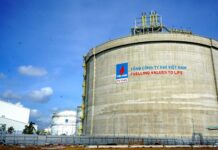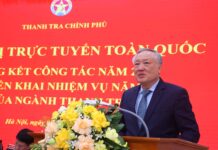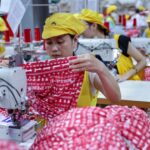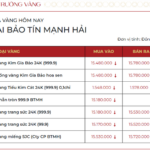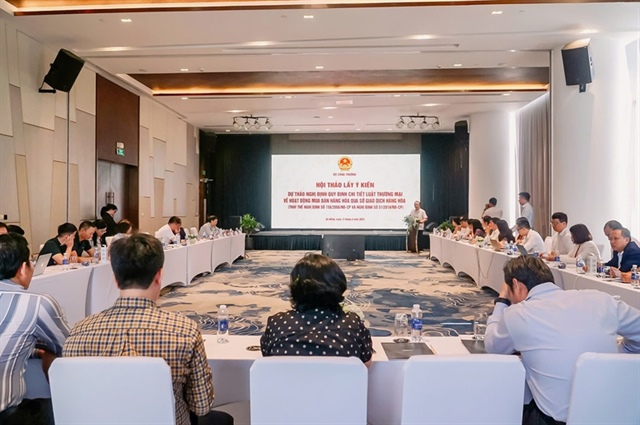
A bird’s-eye view of the workshop |
Kicking off the workshop, Mr. Tran Huu Linh, Director of the Department of Domestic Market Management and Development (Ministry of Industry and Trade), shared that despite the country’s economic and trade progress over the past two decades, the 2005 Commerce Law remains forward-thinking in many aspects, notably the provisions related to the Commodity Exchange.
In 2006, the government issued Decree No. 158/2006/ND-CP detailing the Commerce Law on trading activities through the Commodity Exchange (Decree 158). In 2018, to align with practical needs, the government issued Decree No. 51/2018/ND-CP amending and supplementing a number of articles of Decree No. 158/2006/ND-CP on trading activities through the Commodity Exchange (Decree 51).
Following the enactment of Decree 51, many obstacles for the Commodity Exchange model were removed. However, through the practical operations of the Commodity Exchange, Decree 158 and Decree 51 continue to reveal issues that necessitate amendment and supplementation.
In the first draft of the amending decree issued by the Ministry of Industry and Trade on August 5, the ministry clarified the content of commodity transactions, regulations, and relevant subjects involved in commodity trading activities in Vietnam.
According to the Ministry of Industry and Trade, as the commodity trading market increasingly assumes a financial nature and demands a more specialized supervision capability, the ministry is not fully equipped with a dedicated organizational apparatus, personnel with appropriate professional qualifications, or an infrastructure system that meets the management requirements for financial derivatives activities. Therefore, the ministry suggested that the Ministry of Industry and Trade manage physical commodity transactions through the Commodity Exchange, while the Ministry of Finance oversees commodity derivatives. During its operation, the Commodity Exchange is subject to the management of two independent agencies: the Ministry of Industry and Trade and the Ministry of Finance.
“Managing commodity purchase and sale contracts through the Commodity Exchange” should be under one authority
According to the experts attending the workshop, the Commerce Law has been in effect for 20 years, and Decree 158, issued in 2006, along with Decree 51, which amends Decree 158 and was issued in 2018, mainly focus on international inter-exchange transactions. Thus, it is necessary to formulate a new decree to replace Decree 158 and Decree 51 to promptly address the current market’s challenges while adhering to the Commerce Law.
Assoc. Prof. Dr. Dinh Dung Sy, former head of the Legal Affairs Department of the Government Office, arbitrator of the Vietnam International Arbitration Center (VIAC), emphasized the need to enhance the authority of the Commodity Exchange while improving the capacity of state management agencies. Other ministries and sectors should fulfill their assigned functions and tasks. The market management function also needs to be clearly delineated between the ministry and the department.
Regarding the conditions for the establishment of the Exchange, the proposed increase in charter capital from VND 150 billion to VND 1,000 billion should be accompanied by a reasonable roadmap to help enterprises adapt and protect the interests of shareholders and contributing members.
Mr. Sy stressed that the new decree has untangled the bottleneck between derivative and physical commodities and aims to list Vietnamese commodities on the international market. However, instead of separating state management as suggested in the draft, it is essential to concentrate authority and supervision at the Ministry of Industry and Trade, in line with current legal regulations.
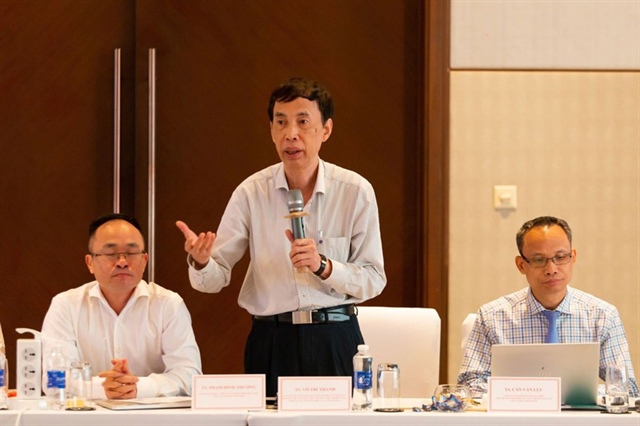
Dr. Vo Tri Thanh, Director of the Institute for Brand and Competition Strategy Research |
From a market perspective, Dr. Vo Tri Thanh, Director of the Institute for Brand and Competition Strategy Research, suggested formulating a project or strategy to develop the commodity trading market, ensuring clear and synchronized long-term orientation. He also expressed concern about the Commodity Exchange’s operating model, as the draft assigns too many responsibilities to the Exchange. In his opinion, it is necessary to carefully consider whether this exceeds the scope of the Enterprise Law because, in its legal nature, the Exchange is also an enterprise.
Dr. Can Van Luc opined that the requirement for Vietnamese commodities to be inter-traded with foreign exchanges should not be emphasized. Instead, it is more important for commodities to meet comprehensive standards to enhance the prestige and integration capacity of Vietnamese commodities.
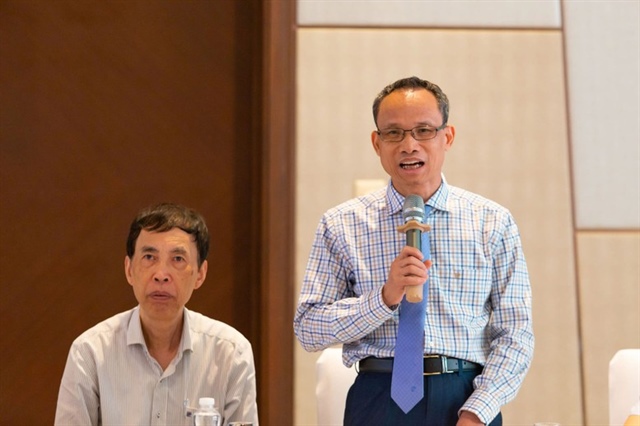
Dr. Can Van Luc |
Regarding state management, he suggested that there should be no separation between the Ministry of Industry and Trade and the Ministry of Finance because, currently, only about 5% of transactions through the Exchange involve physical delivery worldwide. He proposed establishing a joint committee comprising representatives from the Ministry of Industry and Trade, the State Bank, the Ministry of Finance, and relevant ministries to manage the market’s activities effectively and cohesively.
Ms. Vu Thu Thuy, Deputy General Director of MXV, also requested retaining the mechanism where the Ministry of Industry and Trade is the focal point for state management of trading activities through the Commodity Exchange. According to the 2005 Commerce Law, this agency has been assigned the authority to manage commodities and effectively performs licensing and comprehensive supervision of the Exchange’s operations. Meanwhile, the Ministry of Finance maintains its coordinating role in finance without becoming an independent management agency for “derivatives.”
Focus on human resource training for the market and strengthen state management for market participants
At the workshop, another issue highlighted by many experts was that after more than 15 years of operation, Vietnam’s commodity trading market is still considered “new” by many organizations, individuals, and even some management agencies outside the Ministry of Industry and Trade. This is due to the lack of systematic, in-depth, and widespread training and dissemination programs in localities and industries.
Notably, the current legal system does not provide for training and certification for brokers in buying and selling commodities through the Commodity Exchange, although Clause 1, Article 69 of the Commerce Law mandates the government to stipulate this. In other conditional business sectors such as real estate, securities, accounting, and auditing, the practice license is an essential tool to monitor and ensure professional ethics and prevent violations. The commodity trading market needs a similar mechanism.
Additionally, the current approval process for Trading Members and Broker Members is conducted by the Commodity Exchange itself based on civil contracts, lacking administrative management power. Therefore, many opinions suggest that the Ministry of Industry and Trade should directly grant operating licenses to members to enhance management effectiveness.

Ms. Vu Thu Thuy, Deputy General Director of MXV, suggested retaining the mechanism where the Ministry of Industry and Trade is the focal point for state management of trading activities through the Commodity Exchange. |
Regarding the provisions on the Commodity Exchange’s establishment license, Ms. Thuy pointed out some inconsistencies in Clause 2, Article 12, Article 13, Clause 2, Article 14, and Article 24 of the draft. Specifically, limiting the license validity to five years is too short, lacking convincing justification and inconsistent with the Enterprise Law and international practices. Therefore, the current regulations on license content should be maintained, without adding requirements for branches or intended locations to the license. Enterprises still have the obligation to register and notify the business registration agency when opening new branches or subordinate units.
Moreover, Ms. Thuy opined that the draft stipulates that the Ministry of Industry and Trade manages the Commodity Receiving Center (which can be a unit directly under the Commodity Exchange or authorized by the Exchange under the enterprise-enterprise relationship). This provision intervenes too deeply in the enterprise’s business activities, contradicting the orientation for ministries and sectors to focus only on state management at the macro level.
Opinion of the Vietnam Coffee – Cocoa Association
Sharing the same view as MXV, Mr. Thai Van Hiep, Vice President of the Vietnam Coffee – Cocoa Association (VICOFA), stated that buying and selling commodities through the Commodity Exchange is a commercial activity closely related to commodities. Physical commodity transactions and forward contracts, option contracts are two steps in the same transaction process for the same type of commodity, occurring simultaneously on the same trading platform. This facilitates the diversification of delivery or net settlement options for parties without creating a separate transaction.
Along with that, Mr. Hiep mentioned that enterprises still face difficulties regarding accounting and tax declaration procedures. Meanwhile, the tax management agency does not fully understand the nature of price insurance through the Commodity Exchange. Therefore, VICOFA proposed that the Ministry of Industry and Trade coordinate with the Ministry of Finance to provide guidelines and directions for enterprises on price hedging in terms of accounting and tax procedures.
Concluding the workshop, Mr. Tran Huu Linh affirmed that the ministry would absorb the contributions of experts, association representatives, and the Vietnam Commodity Exchange to adjust the draft’s content and submit it to the government as planned. The ministry will also continue to research and develop a strategy to promote trading activities through the Commodity Exchange.
|
Previously, on August 6, the Ministry of Finance also issued Official Dispatch No. 11999/BTC-UBCK to the Ministry of Industry and Trade regarding trading activities through the Commodity Exchange. In this document, the Ministry of Finance stated that according to Clause 2, Article 8 of the Commerce Law No. 36/2005/QH11, the Ministry of Industry and Trade is responsible to the Government for implementing state management of trading activities and specific commercial activities stipulated in this Law. Based on this, the Ministry of Finance proposed that the Ministry of Industry and Trade continue to implement the management of the commodity derivatives market and specific commercial activities according to the Commerce Law and its guiding documents. |
The August Revolution and National Day, September 2nd: Enduring Values for a Modern Age
Vice Prime Minister Nguyen Hoa Binh affirmed that since the August Revolution of 1945, history has been gloriously unfolding. The era of independence and freedom was followed by an era of national reunification, peace, and development, which will be succeeded by a new era of prosperity and strength.
The Future is Now: Unveiling Phu Tho’s 300-Hectare Industrial Hub in Just 6 Days
The Nam Binh Xuyen Industrial Park project is set to become one of the most advanced manufacturing hubs in Northern Vietnam upon the completion of its infrastructure.
One-Minute Tax Talk: Are Electronic Invoices Mandatory for Private Clinics with Annual Revenue of 950 Billion?
“The Tax Authority has shed light on tax rates applicable to business households, offering much-needed clarity to entrepreneurs across the nation.”


